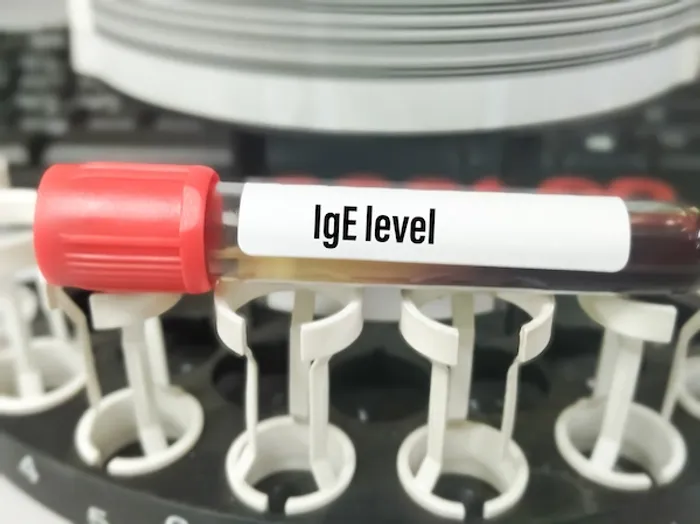Understanding High IgE Levels and Risks
Know what your IgE levels tell about your health. Learn about causes, symptoms and management during high IgE levels.


Introduction
If you’ve recently had a blood test and discovered that your Immunoglobulin E (IgE) levels are high, you might be wondering what this means for your health. High IgE levels are often linked to allergies, infections, or other immune-related conditions.
In this article, we’ll break down what IgE is, why it might be elevated, and what steps you can take to manage it.
What is IgE?
IgE (Immunoglobulin E) is a type of antibody produced by your immune system. Its main job is to protect your body from harmful substances like parasites, bacteria, and viruses. However, IgE is also heavily involved in allergic reactions. When your body mistakenly identifies harmless substances (like pollen, dust, or certain foods) as threats, it produces more IgE, leading to allergy symptoms.
What Causes High IgE Levels?
Several factors can contribute to elevated IgE levels, including:
- Allergies – The most common cause. Conditions like hay fever, asthma, eczema, and food allergies trigger IgE production.
- Parasitic Infections – Certain worm or parasite infections can increase IgE levels.
- Autoimmune Disorders – Some immune-related diseases, such as hyper-IgE syndrome, cause abnormally high IgE.
- Chronic Infections – Long-term infections (bacterial, fungal, or viral) may keep IgE levels elevated.
- Certain Cancers – Rarely, blood cancers like myeloma or lymphoma can affect IgE production.
Symptoms of High IgE Levels
Since high IgE is often linked to allergies or infections, symptoms may include:
- Allergic Reactions
Sneezing, runny nose, itchy eyes, and skin rashes (eczema or hives). - Asthma Symptoms
Wheezing, shortness of breath, chest tightness. - Frequent Infections
Recurrent sinus infections, bronchitis, or skin infections. - Digestive Issues
If food allergies are involved, you may experience nausea, diarrhoea, or bloating.
How High IgE Affects Your Health?
While IgE itself is not harmful, persistently high levels can indicate underlying health concerns:
- Increased Allergy Risk
More IgE means stronger allergic reactions, which can sometimes lead to severe responses like Anaphylaxis - Chronic Inflammation
Long-term high IgE can contribute to ongoing inflammation and worsening conditions like asthma or eczema. - Immune System Overactivity
In rare cases, excessive IgE may signal an immune disorder requiring medical attention.
Consult Top Specialists for Personalised Health Advice
How to Manage High IgE Levels?
If your IgE levels are high, here are some ways to manage them:
1. Identify and Avoid Triggers
- If allergies are the cause, an allergy test can help pinpoint triggers (like pollen, dust mites, or certain foods).
- Once identified, try to minimise exposure.
2. Medications
- Antihistamines like cetirizine or loratadine can help control allergy symptoms.
- Nasal sprays or inhalers may be prescribed for asthma or hay fever.
- In severe cases, immunotherapy (allergy shots) can help desensitise your immune system.
3. Boost Immunity Naturally
- Eat a balanced diet rich in antioxidants (fruits, vegetables, nuts).
- Stay hydrated and maintain good hygiene to prevent infections.
- Probiotics (found in yoghurt, kefir) may help regulate immune responses.
4. Regular Check-ups
- If high IgE persists, consult a doctor to rule out infections or immune disorders.
- Monitoring IgE levels over time helps track treatment effectiveness.
When to See a Doctor?
You should seek medical advice if:
- You experience severe allergic reactions as swelling and difficulty breathing.
- Symptoms interfere with daily life as a chronic cough, persistent rashes.
- You have recurrent infections without a clear cause.
If you suspect high IgE is affecting your health, consider booking a consultation with an allergist or immunologist through Apollo 24|7 for personalised care.
Final Thoughts
High IgE levels are usually a sign that your immune system is reacting to something, whether it’s allergies, infections, or another condition. While it’s not always serious, understanding the cause and taking steps to manage it can improve your quality of life. If you’re unsure about your IgE levels or symptoms, don’t hesitate to reach out to a healthcare provider for guidance.
Consult Top Specialists for Personalised Health Advice
Consult Top Specialists for Personalised Health Advice

Dr. Lakshmi Sanjitha Kakani
General Physician/ Internal Medicine Specialist
6 Years • MBBS, MD (General Medicine)
Visakhapatnam
Apollo 24|7 Clinic - Andhra Pradesh, Visakhapatnam

Dr D M Karthik
General Practitioner
4 Years • MBBS, Fellowship in Diabetes Mellitus, Advance certificate in Diabetes Mellitus, Derma Nutrition Certification
Visakhapatnam
Apollo 24|7 Clinic - Andhra Pradesh, Visakhapatnam

Dr. Shubham Chauhan
General Practitioner
4 Years • MBBS
Lucknow
Apollo 24|7 Clinic - Uttar Pradesh, Lucknow

Dr. Dhankecha Mayank
General Practitioner
6 Years • MBBS
Hyderabad
Apollo 24|7 Clinic - Telangana, Hyderabad

Dr. Vasanthasree Nair
General Practitioner
15 Years • MBBS
Angamaly
Apollo 24|7 Clinic - Kerala, Angamaly
(525+ Patients)
Consult Top Specialists for Personalised Health Advice

Dr. Lakshmi Sanjitha Kakani
General Physician/ Internal Medicine Specialist
6 Years • MBBS, MD (General Medicine)
Visakhapatnam
Apollo 24|7 Clinic - Andhra Pradesh, Visakhapatnam

Dr D M Karthik
General Practitioner
4 Years • MBBS, Fellowship in Diabetes Mellitus, Advance certificate in Diabetes Mellitus, Derma Nutrition Certification
Visakhapatnam
Apollo 24|7 Clinic - Andhra Pradesh, Visakhapatnam

Dr. Shubham Chauhan
General Practitioner
4 Years • MBBS
Lucknow
Apollo 24|7 Clinic - Uttar Pradesh, Lucknow

Dr. Dhankecha Mayank
General Practitioner
6 Years • MBBS
Hyderabad
Apollo 24|7 Clinic - Telangana, Hyderabad

Dr. Vasanthasree Nair
General Practitioner
15 Years • MBBS
Angamaly
Apollo 24|7 Clinic - Kerala, Angamaly
(525+ Patients)
.webp)